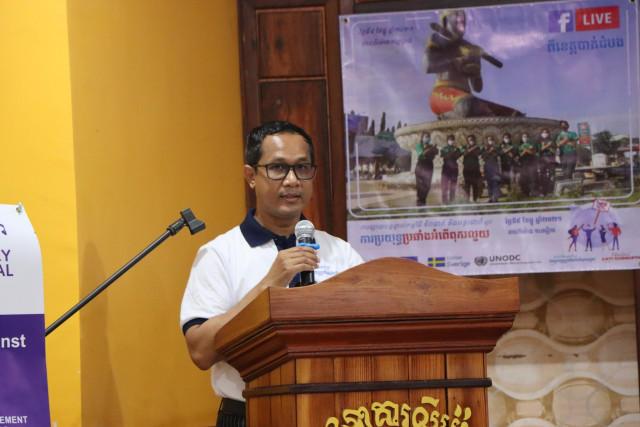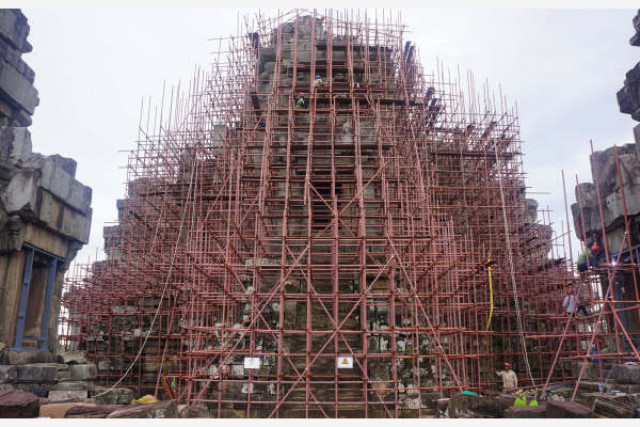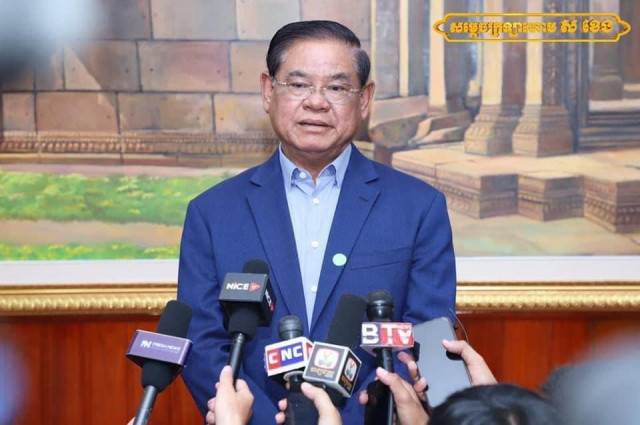Corruption: Why More Has to Be Done in Cambodia

- By Phoung Vantha
- January 22, 2022 5:13 PM
An expert highlights the progress made and weaknesses to address in Cambodia to eliminate corruption and create an environment conducive to business investments and building public trust
Pech Pisey is executive director of Transparency International Cambodia, which is the country chapter of the NGO Transparency International whose goal is to stop corruption and promote accountability and integrity in all sectors of society.
Holding a Bachelor of Arts in Philosophy from the Royal University of Phnom Penh, and a Master Degree in Globalisation, Development and Transition, International Relation and Affairs from the University of Westminster in London, United Kingdom, Pisey has worked for several international organizations including the United Nations Development Programme and BBC Media Action before joining TI Cambodia in 2012.
Pech Pisey was asked to talk of the situation in the country regarding corruption, the effects this may have on the population and business sector, and what needs done to improve the situation.
Phoung Vantha: Firstly, would you explain how you came to work for Transparency International Cambodia? What attracted you to this field? And how does it work: Do you investigate mainly based on complaints or information you receive, or based on your own research?
Pech Pisey: The journey that has led me to Transparency International's anti-corruption movement was my passion for positive social changes and the understanding of the root causes and fundamental problems that Cambodia is facing and the devastating ripple effects that corruption has caused on the governance system and the people it supposes to serve.
Corruption can negatively affect people's livelihood, health, rights, freedom and even lives. It erodes democratic freedom, the rule of law and trust in government. Corruption reduces the chances of a healthy environment and a sustainable future. People's future of a better life will be lost if the state budget on critical infrastructure, health, education and social protection is stolen.
People's chances of fair access to justice will be denied if corruption is used to evade justice. Corruption is like a cancer that each country needs to detect as early as possible to increase the chance of appropriate cures before it is too late. And I would like to be one of the people who can increase Cambodia's opportunity to survive from this cancer and secure its prosperous future beyond this cancer.
Phoung Vantha: What are the key issues that Cambodia faces in terms of corruption? How have things evolved – improving or getting worse – in recent years? And which sectors or areas still need the most work?
Pech Pisey: Cambodia is performing well economically and the Royal Government of Cambodia has taken measures to deliver impressive economic achievements. Prior to the COVID-19 crisis, Cambodia enjoyed decades of strong growth, which averaged 7.6 percent between 1994 and 2015. The World Bank reported Cambodia as one of the 10 fastest-growing economies in the world over the past 20 years, moving Cambodia from a low-income to a low-middle income country in 2016. Despite this impressive economic growth, Cambodia is still facing tremendous challenges in terms of democratic governance, human rights violation, weak rule of law, shrinking civic space and widespread corruption.
To sustain growth and ensure long-term social cohesion and economic sustainability, Cambodia must face and systematically address these fundamental challenges, and cope with the growing public demands for transparency, anti-corruption action and public accountability. There are, however, some positive signs of progress that are worth recognizing such as the significant efforts of the government on reform of public financial management, public administration and decentralization.
Evidence has shown that Cambodia has reduced petty corruption and public services have improved. On the other hand, grand corruption and political corruption remain to be the most critical challenges to be addressed. Cambodia also needs to improve better access to justice and the independence of the judiciary, which is the cornerstone of social justice and rule of law. Cambodia can do much more and strengthen itself by reducing corruption and improving the judicial system. The more Cambodia can eliminate corruption in all forms, the more people will want to invest in the country, which would lead to further growth and strengthen Cambodia's financial independence as well as its sovereignty.
Phoung Vantha: Do you feel the government has been successful in systematically fighting corruption? How does the Anti-Corruption Unit work and has it produced results?
Pech Pisey: The government has made notable efforts to address corruption, thanks to the commitments of the Anti-Corruption Unit (ACU) to implement its education and prevention strategy, and the Ministry of Interior to increase accountability and improve public services, especially basic public services, which has led to a decrease in petty corruption.
It is important to also highlight the progress that has been made by the ACU and the Ministry of Information to address key recommendations under the United Nations Convention against Corruption reviews such as the development of draft laws on whistleblower protection and access to information. More needs to be done to systematically reduce corruption in Cambodia, and the public has high expectations of the government's Anti-Corruption Unit taking the lead in eradicating corruption and give a leadership that can respond effectively to the gravity of corruption issues.
Phoung Vantha: What steps do you see as necessary for both the government and the private sector to take in order to reduce corruption? And do you think there is much will in the government or the private sector to take action?
Pech Pisey: To become an attractive investment destination, especially for large-scale and genuine investment projects, Cambodia needs to address key barriers to investments, improve the investment climate and promote fair competition through eliminating corruption, reducing its bureaucratic burdens, and increasing corporate compliance.
With SMEs [small and medium-sized enterprises] overwhelmingly dominating economic activities, the government needs to develop and implement pro-poor and pro-SME policies as well as attractive tax incentives that support and encourage businesses to move from shadowy business activities to formal business activities that comply with rules and regulations. The private sector has an influential role to play when it comes to supporting and convincing the government to address the above key challenges and promote clean businesses. But to be frank, I think the private sector did not use that leverage well to address their fundamental problems. Moreover, Cambodia is still stuck in a deep-rooted patronage system that requires the current and new leadership to break the chains. It is a politically risky move but it is absolutely necessary to secure Cambodia's future, sustain growth and address social division.
Phoung Vantha: Finally, how many corruption cases were submitted to TI Cambodia by people in 2021, compared to 2020? If there was increase or decrease, to what would you attribute this? Did you see any connection between the impact of the pandemic and the prevalence of corruption?
Pech Pisey: The second half of 2021 saw a drastic drop in the number of people approaching TI Cambodia's Advocacy and Legal Advice Centre (ALAC): 19 (of whom six were female) people contacting for legal advice on various issues compared to 86 cases in 2020, with the COVID-19 community outbreaks and the subsequent lockdown and restrictive measures likely being the main cause. It is fair to say that, as COVID-19 wreaked havoc on the population and affected their livelihoods, public demands for anti-corruption has decreased.
Phoung Vantha: To what extent is corruption rooted in Cambodian society and how do we go about making the country more accountable and transparent when corruption exists at almost every level of governance?
Pech Pisey: There is no denying that Cambodia suffers severe and widespread corruption at all levels and people are frustrated about it and the effects it causes on their daily lives as well as the devastating effects of corruption on Cambodia politically, socially and economically. It is critical that the government and stakeholders acknowledge the problems, understand their root causes and be willing to address these root causes systematically.
Cambodia needs leaders who can provide the leadership that the enormity of the corruption issues demands, and they need to understand that there is an urgency about the corruption situation. Both bottom-up and top-down approaches are required but the top leadership must be the role model and walk the walk if they want the public, officials and the ordinary citizens to follow suit.
It is important that the government make good governance and the issues of corruption a priority. But to tackle this effectively, the government needs to design a comprehensive anti-corruption strategy and implement corruption risk management that fosters collective action from all stakeholders at all levels including relevant government institutions, development partners, non-governmental organizations, media, the private sector and ordinary citizens.
TI Cambodia's youth survey showed that over 96 percent of young people said they are aware of the issues of corruption and the harmful effects it causes on society. However, the survey also found that only a small proportion of them would be willing to take action against corruption due to the elements of fear, intimidation and shrinking civic space.
It is fair to say that, after more than three decades of social and political transformation, Cambodia's population has moved beyond awareness-raising, and the main focus should be on the ability of the state and partners to rally people and competent authorities in taking concrete actions to fight corruption and other challenges. To effectively engage the public and stakeholders in the fight against corruption, Cambodia also needs to hasten the adoption of laws on whistleblower protection and access to Information.
Cambodia's poor accountability has also resulted from poor oversight and lack of independence of the oversight institutions, especially from the judiciary, the legislative branch, the audit commission, the anti-corruption unit and public procurement. It is crucial to have effective and independent oversight bodies in democratic governance. More importantly, the government and relevant authorities should invest more energy and resources in effective law enforcement. TI Cambodia's study consistently showed that Cambodia suffers significant gaps in law enforcement on all fronts.















